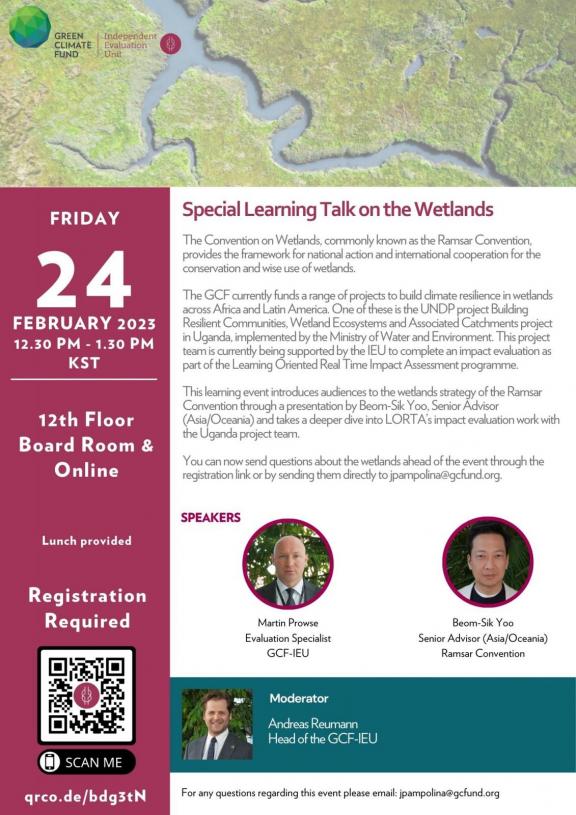Special Learning Talk on the Wetlands
Hybrid
24 February 2023
To celebrate World Wetlands Day, the IEU organized a Special Learning Talk on the Wetlands on 24 February. The event began by introducing audiences to the wetlands strategy of the Ramsar Convention, the Convention on Wetlands, through a presentation by Beom-Sik Yoo, Senior Advisor (Asia/Oceania), and then took a deeper dive into the IEU’s involvement in wetland areas.
Wetlands are considered among the most diverse and productive ecosystems and include all lakes and rivers, coral reefs, and all human-made sites, such as fishponds, rice paddies and reservoirs. The Ramsar Convention is an intergovernmental treaty that provides the framework for national action and international cooperation for the conservation and wise use of wetlands and their resources.
Beom-Sik Yoo opened the talk by providing the audience with an overview of what the Ramsar Convention aims to do, why we should all be concerned about the state of the wetlands, and how the wetlands have been reflected in international commitments to date. With this foundation, he then discussed how different environmental issues have been prioritized in the international space and what this means for wetlands conservation. Yoo closed by highlighting the interlinkages between climate change goals and protecting the wetlands.
These insights were put into greater focus with a presentation by Dr Martin Prowse, Evaluation Specialist at the IEU, on the GCF’s involvement in the wetlands. The GCF currently funds a range of projects to build climate resilience in wetlands across Africa and Latin America. These projects are worth over USD $165 million and will affect the lives of over 5 million people.
Prowse spoke about one of these in more detail, the UNDP project ‘Building Resilient Communities, Wetland Ecosystems and Associated Catchments’ project in Uganda, which is currently being supported by the IEU to complete an impact evaluation as part of the Learning Oriented Real Time Impact Assessment (LORTA) programme. Prowse elaborated on the purpose of LORTA, the methods chosen for this evaluation, and lessons learned to date. A key finding that was stressed was the value of in-person interactions, particularly when working with government bodies to overcome silos and differing understandings of key terms.
Andreas Reumann, Head of the IEU, closed the talk by reiterating the opportunities identified by Yoo on the wetlands – synergy, no regrets, readiness and means. These refer to the positive outcomes that can arise when climate and wetlands interests are combined, the significant potential of wetland solutions, the existing scientific knowledge, data, and institutional frameworks on wetlands conservation, and the visible progress that is being made in climate finance through market and non-market mechanisms.
Recording
